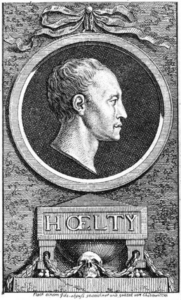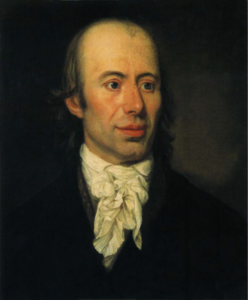Sigh
(Poet's title: Seufzer)
Set by Schubert:
D 198
[May 22, 1815]
Die Nachtigall
Singt überall
Auf grünen Reisen
Die besten Weisen,
Daß ringsum Wald
Und Ufer schallt.
Manch junges Paar
Geht dort, wo klar
Das Bächlein rauschet,
Und steht, und lauschet
Mit frohem Sinn
Der Sängerin.
Ich höre bang
Im düstern Gang
Der Nachtigallen
Gesänge schallen,
Denn ach, allein
Irr ich im Hain.
The nightingale
Sings everywhere
On green branches
The best tunes
Which resound around the wood
And resound around the river bank.
Many a young couple
Goes there, where clearly
The little brook murmurs,
And they stand there and listen
In a delighted mood –
They listen to the singer.
I am uneasy when I hear
On the gloomy path
The nightingale’s
Songs resound;
For oh! I am on my own
As I roam around and go astray in the grove.
All translations into English that appear on this website, unless otherwise stated, are by Malcolm Wren. You are free to use them on condition that you acknowledge Malcolm Wren as the translator and schubertsong.uk as the source. Unless otherwise stated, the comments and essays that appear after the texts and translations are by Malcolm Wren and are © Copyright.
☙
Themes and images in this text:
Being solitary, alone and lonely By water – river banks Detours and delusions Green Melody Night and the moon Nightingales, Philomel Paths Rivers (Bächlein) Sighs and sighing Walking and wandering Woods – groves and clumps of trees (Hain)
The final line of this text suggests that the poet is rambling. The verb ‘irren’ in ‘allein irr’ ich im Hain’ brings together three basic meanings: to wander around (aimlessly), to go astray / to fall into error and (in some contexts) to go mad / to lose your reason. ‘Irren ist menschlich’, ‘errare humanum est’, ‘to err is human’. We have something of this ambiguity in English, but not in a single word: movement and falsehood (an erratic trajectory / an erroneous assertion); movement and madness (he is wandering / his mind was wandering). In pre-PC German, people who ‘wandered off’ (‘irrten’) and fell into ‘Irrtum’ (error) might be said to be at risk of being sent to an ‘Irrenhaus’ (a madhouse / loony bin).
He does not conform, he does not fit in for the simple reason that he is alone. For couples everything is clear, but for the poet the track is gloomy; couples can stop and listen to the nightingale in delight but its song is something the poet hears with a heavy heart. The couples seek it out but it imposes itself on him (Hölty emphasises the distinction between ‘listening’ and ‘hearing’). The nightingale sings the best songs: the lines of its melodies are direct and go straight (to the heart), whereas the poet (in the same wood at the same time) is left rambling aimlessly. His cadences are not resolved.
☙
Original Spelling Seufzer Die Nachtigall Singt überall Auf grünen Reisen Die besten Weisen, Daß ringsum Wald Und Ufer schallt. Manch junges Paar Geht dort, wo klar Das Bächlein rauschet, Und steht, und lauschet Mit frohem Sinn Der Sängerin. Ich höre bang' Im düstern Gang Der Nachtigallen Gesänge schallen; Denn ach! allein Irr' ich im Hain.
Hölty´s original, Die Nachtigall
Die Nachtigall
Singt überall,
Auf grünen Reisen,
Die besten Weisen,
Tönt süße Ruh
Den Leuten zu.
Der grüne Wald
Und Busch erschallt
Von ihrer Minne.
Mit frohem Sinne
Hört jedermann
Den Vogel an.
Ich, leider, nicht,
Es bricht, es bricht,
Trotz allen Fugen,
So Vögel schlugen,
Vor Minneschmerz,
Mein armes Herz.
Voß´s edition, Seufzer
Die Nachtigall
Singt überall
Auf grünen Reisen
Die besten Weisen,
Daß ringsum Wald
Und Ufer schallt.
Manch junges Paar
Geht dort, wo klar
Das Bächlein rauschet,
Und steht, und lauschet
Mit frohem Sinn
Der Sängerin.
Ich höre bang’
Im düstern Gang
Der Nachtigallen
Gesänge schallen;
Denn ach! allein
Irr’ ich im Hain.
Confirmed with Ludwig Christoph Heinrich Hölty’s Sämtliche Werke kritisch und chronologisch herausgegeben von Wilhelm Michael, Erster Band, Weimar, Gesellschaft der Bibliophilen, 1914, page 133; and with Gedichte von Ludewig Heinrich Christoph Hölty. Nebst Briefen des Dichters herausgegeben von Karl Halm. Leipzig: F.A. Brockhaus, 1869, page 158.
Confirmed by Peter Rastl with Schubert’s source, Gedichte von L. H. Ch. Hölty. Neu besorgt und vermehrt von Johann Heinrich Voß. Wien, 1815. Bey Chr. Kaulfuß und C. Armbruster. Gedruckt bey Anton Strauß. Meisterwerke deutscher Dichter und Prosaisten. Drittes Bändchen. page 158; and with Gedichte von Ludewig Heinrich Christoph Hölty. Besorgt durch seine Freunde Friederich Leopold Grafen zu Stolberg und Johann Heinrich Voß. Hamburg, bei Carl Ernst Bohn. 1783, page 184.
This is the version of Hölty’s poem heavily reworked by Voß.
To see an early edition of the text, go to page 158 [236 von 300] here: http://digital.onb.ac.at/OnbViewer/viewer.faces?doc=ABO_%2BZ15769170X



